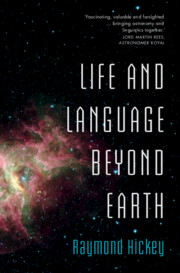Book contents
- Life and Language Beyond Earth
- Reviews
- Life and Language Beyond Earth
- Copyright page
- Contents
- Tables and Figures
- Preface
- How to Use This Book
- Part I Introduction
- Part II The Universe We Live In
- Part III Our Story on Earth
- Part IV The Runaway Brain
- Part V Language, Our Greatest Gift
- 20 Looking at Language
- 21 Talking about Language
- 22 The View from Linguistics
- 23 The Language Faculty and Languages
- 24 Language and the Brain
- 25 Acquiring Language
- 26 Humans and Animals
- Part VI Life and Language, Here and Beyond
- Book part
- Glossary
- Timelines
- Figure credits
- References
- Bibliography
- Index
25 - Acquiring Language
from Part V - Language, Our Greatest Gift
Published online by Cambridge University Press: 16 September 2023
- Life and Language Beyond Earth
- Reviews
- Life and Language Beyond Earth
- Copyright page
- Contents
- Tables and Figures
- Preface
- How to Use This Book
- Part I Introduction
- Part II The Universe We Live In
- Part III Our Story on Earth
- Part IV The Runaway Brain
- Part V Language, Our Greatest Gift
- 20 Looking at Language
- 21 Talking about Language
- 22 The View from Linguistics
- 23 The Language Faculty and Languages
- 24 Language and the Brain
- 25 Acquiring Language
- 26 Humans and Animals
- Part VI Life and Language, Here and Beyond
- Book part
- Glossary
- Timelines
- Figure credits
- References
- Bibliography
- Index
Summary
You have already performed the greatest feat of your life, although you most likely are unaware of it. This is the acquisition of your native language. Within the first few years of your life, you went from nothing to a fully competent speaker of the language(s) you were exposed to. That happens unconsciously, without any instruction,1 in a very short time, with native-speaker competence as the result.
Would the same hold for exobeings? Indeed, would it be valid to assume that exobeings have a division of their lifespans into childhood and adulthood as with humans? Recall that for Darwinian evolution to occur there must be some way for an organism to reproduce and be gradually subject to natural selection. If sexual reproduction applied in the animal world of an exoplanet, reaching sexual maturity would be a feature of animal life.
- Type
- Chapter
- Information
- Life and Language Beyond Earth , pp. 410 - 424Publisher: Cambridge University PressPrint publication year: 2023

